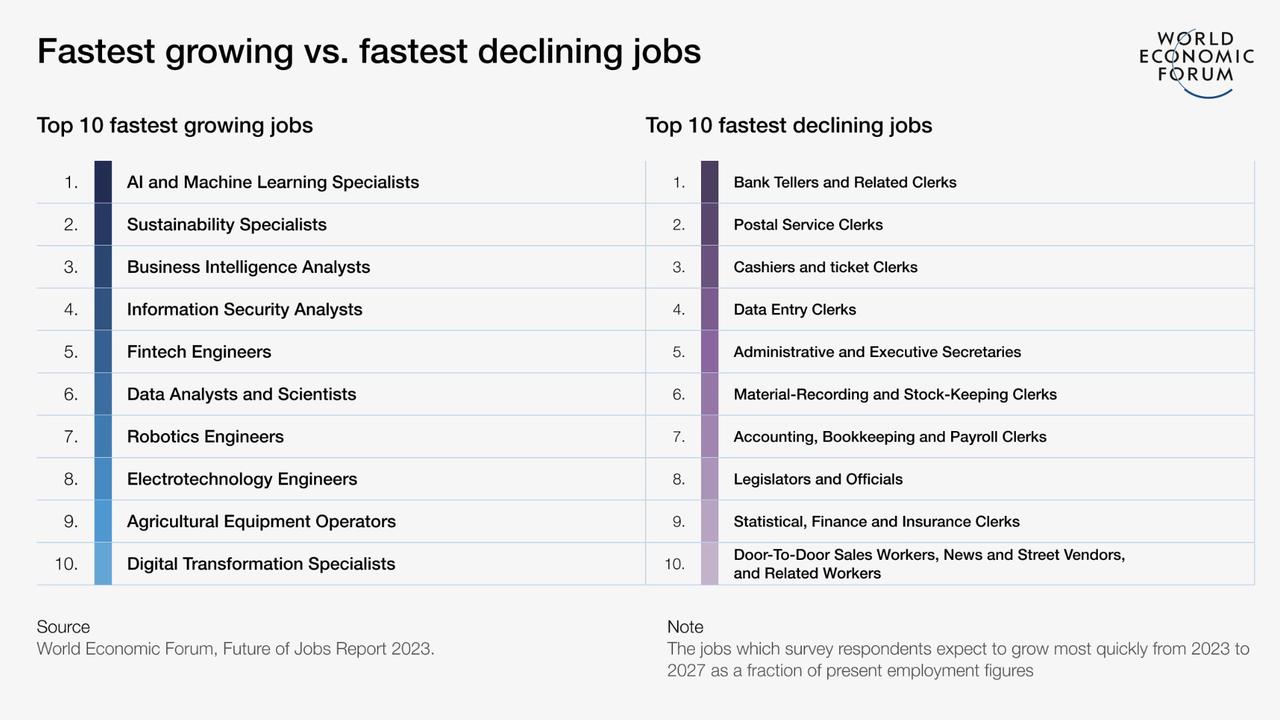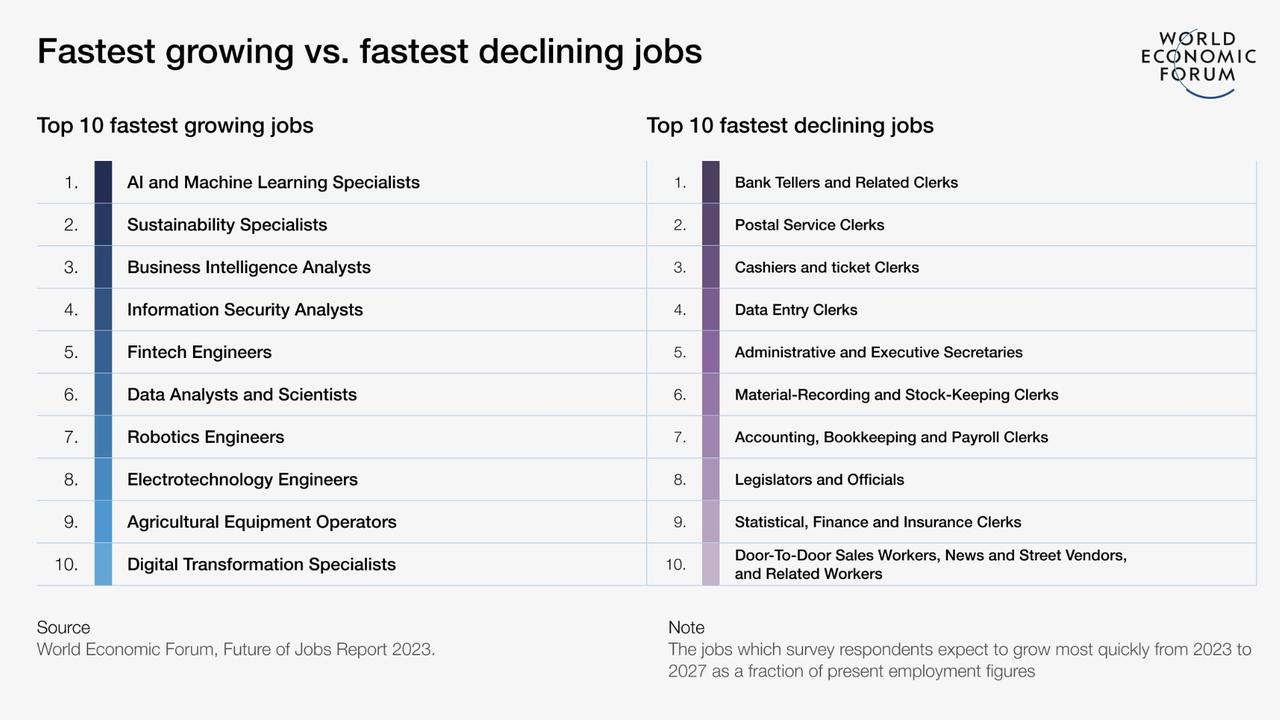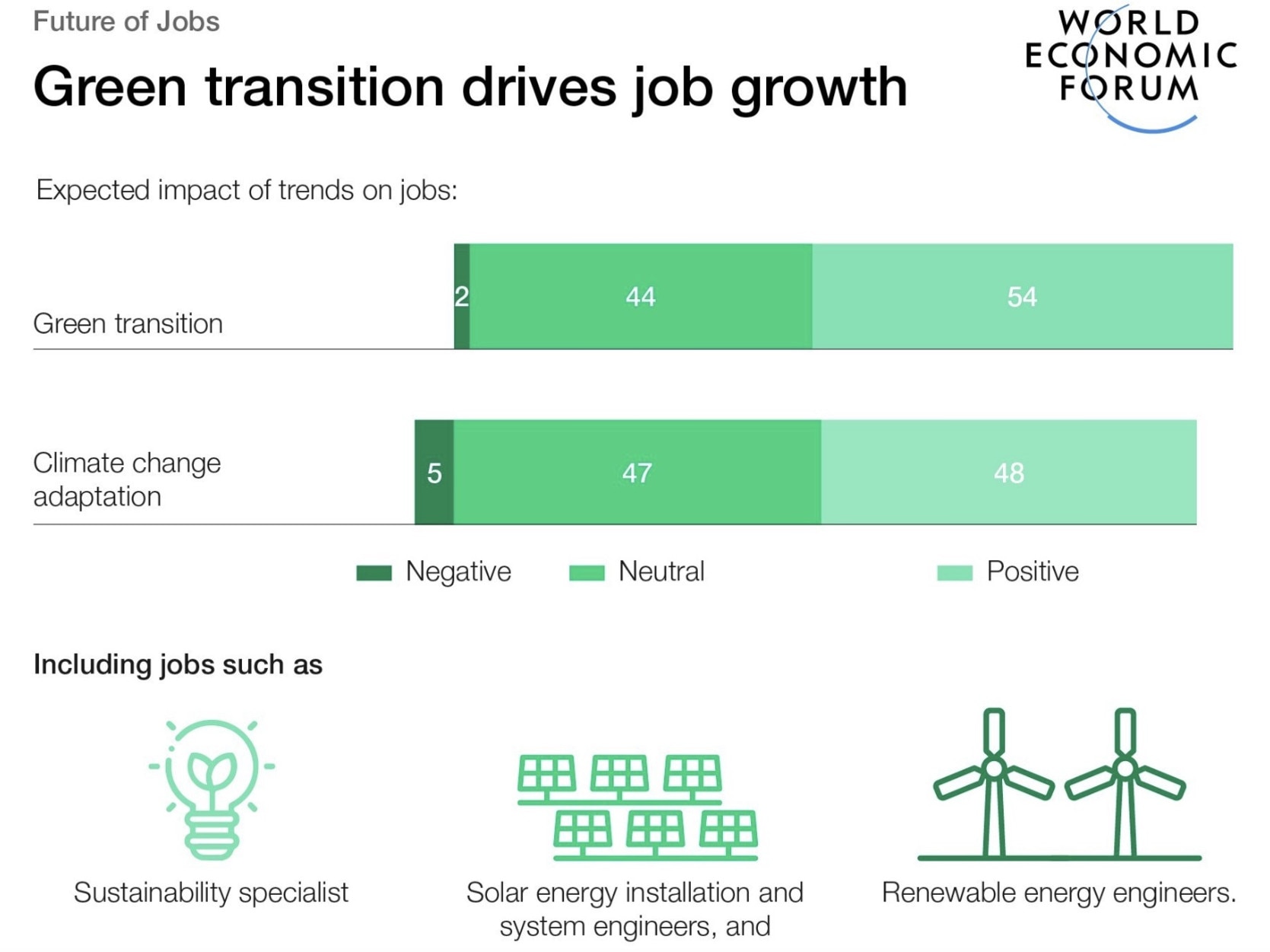World Economic Forum predicts 14 million jobs will evaporate over the next five years
The latest global report into the future of the workplace has revealed a few uncomfortable truths as artificial intelligence makes unprecedented gains.

Careers
Don't miss out on the headlines from Careers. Followed categories will be added to My News.
It’s no secret, the global labour market is currently facing a disruption of biblical proportions.
The World Economic Forum’s Future of Jobs Report 2023 warns us that 23 per cent of jobs are expected to go through a tectonic shift in the next five years.
The report summed up the next chapter in one word. Disruption.
The report notes that advancements in technology and digitisation are at the forefront of this labour market downturn. Of the 673 million jobs reflected in the dataset in this report, respondents expect structural job growth of 69 million jobs and a decline of 83 million jobs.
The rise of artificial intelligence and other technologies is the main culprit behind this wave of predicted unemployment.
A whopping three-quarters of the 803 companies surveyed are planning to adopt big data, cloud computing, and AI technologies in the next five years.
Respondents predicted that 42 per cent of business tasks will be automated by 2027, estimating that 44 per cent of the current workforce’s skills “will be disrupted in the next five years”, with as many as 60 per cent “requiring more training” within five years.
By that time, task automation is expected to vary from 35 per cent of “reasoning and decision-making” to 65 per cent of “information and data processing”. This is predicted to be solved by mass restructuring of businesses to compete in the rapidly accelerating market.
But the global shift to save the bottom line will likely come at the expense of workers occupying soon to be “outdated” professions.
Traditional jobs, such as bank tellers, postal service clerks, and data entry staff, are expected to decline by over a third in the coming years, leaving millions out of work. Meanwhile data clerks, who are projected to take the biggest hit, will be hit with an estimated 8 million job losses in the next five years.
So, what‘s the solution? According to the report, governments and businesses must invest in supporting the shift to the jobs of the future through education, re-skilling, and social support structures.

A global push towards green energy could also create 30 million jobs globally in low-emissions technologies by 2030, according to the report.
“In response to the climate crisis and anticipated job losses, there are global efforts to decarbonise, leading to an abundance of green jobs across various sectors and industries,” it reads.
“According to the International Energy Agency, a green-recovery plan could generate an additional 3.5% of global GDP growth and create 9 million new jobs annually.
“Despite the persistent growth of green jobs over the past four years, reskilling and upskilling towards green skills are not progressing at the same rate.”
Managing Director Saadia Zahidi says there is a “clear way forward” for the future of work, but emphasised the need for adaptation amid the rapidly changing environment, largely affected by increasingly powerful artificial intelligences.
“For people around the world, the past three years have been filled with upheaval and uncertainty for their lives and livelihoods, with Covid-19, geopolitical and economic shifts, and the rapid advancement of AI and other technologies now risks adding more uncertainty,” she said.
“The good news is that there is a clear way forward to ensure resilience. Governments and businesses must invest in supporting the shift to the jobs of the future through the education, re-skilling and social support structures that can ensure individuals are at the heart of the future of work.”
The report states that a majority of companies surveyed said they will prioritise women (79 per cent), youth under 25 (68 per cent) and those with disabilities (51 per cent) as part of their DEI (Diversity, equity and inclusion) programs.
Meanwhile, 39 per cent of companies said they will prioritise those from a disadvantaged religious, ethnic or racial background moving forward. Workers over age 55 (36 per cent), those who identify as LGBTQI+ (35 per cent) and those from a low-income background (33 per cent).

The report is the fourth of its kind presented by The World Economic Forum, an international non-governmental and lobbying organisation that purports to have the ability to predict future trends and offer solutions for what it believes to be “the new normal”.
According to the organisation, the globe is “undergoing interacting crises in food, energy, health and nature that are threatening our way of life and accelerating us towards a global catastrophe”.
In its 2020 Future of Jobs report, the WEF highlighted the challenges ahead with the global workforce “automating faster than expected”.
The organisation predicts that “employers will divide work between humans and machines roughly equally” by 2025.
“Some 43 per cent of businesses surveyed indicate that they are set to reduce their workforce because of technology integration, 41 per cent plan to expand their use of contractors for task-specialised work, and 34 per cent plan to expand their workforce as a result of technology integration,” the report stated.
The World Economic Forum has a controversial history as an organisation, with critics regularly slamming the cabal of “global elites” over their hypocrisy in dealing with climate change.
WEF organisers face annual criticism over the emissions caused by the event that sees policymakers, CEOs, academics and journalists along with an army of caterers and support staff head to the Alpine village.
The climate crisis is high on the organisation’s list of purported priorities and references the changes world governments need to make to ensure a positive outcome for the future. However, it appears those changes need only apply to those without private jets.
Greenpeace recently slammed the WEF over their recent congregation of minds in the Swiss Alps, referencing research which showed that people who attended last year had made roughly 500 private flights in and out of airports near the exclusive ski resort.
The WEF remains a strong supporter of battling the climate crisis. However, the disruption caused in the job market via costly restructuring to meet green energy targets has created instability.
According to the reports, the largest job creation and destruction effects come from environmental, technology and economic trends.
The three key drivers of expected net job destruction are slower economic growth, supply shortages and the rising cost of inputs, and the rising cost of living for consumers.
However, the report claims the the impact of most technologies on jobs will be a “net positive over the next five years”, with big data analytics, climate change and environmental management technologies, and encryption and cybersecurity expected to be the biggest drivers of growth.
Originally published as World Economic Forum predicts 14 million jobs will evaporate over the next five years







